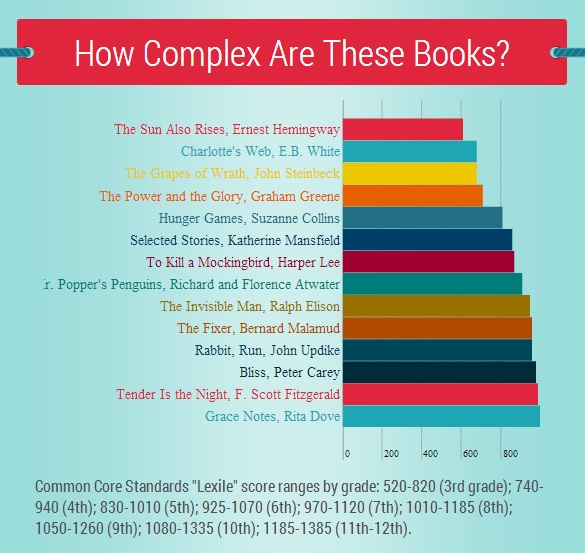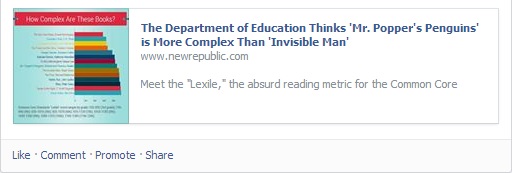My response (a.k.a. what I shared on my facebook wall)Fancy words and complex grammar do not great literature make; complexity has more to do with the cognitive reasoning it requires to understand, digest, and articulate the meaning beneath those words and sentences. I was supposed to be writing already, but I was distracted by the insanity put forth in this article. Why do we live in a world where we have to measure EVERYTHING onto a scale to decide whether it's worth doing (or reading, in this case)? The headline down there* is wrong; while "The Invisible Man" is (slightly) more complex than its comparison, it meant to say that "The Department of Education Thinks 'Mr. Popper's Penguins' is More Complex Than 'The Grapes of Wrath'" ---- because, seriously? Ranking books based on vocabulary words and sentence length alone, while not taking into account actual meaning and subtext, is confounding to me. I know books are subjective and people argue over them all the time, so I'm simply adding fuel to that fire; but all this list tells me is that when I write my first book, I will make sure to use the correct vocabulary and sentence length to achieve a highest possible placement on the Lexile, thus ensuring that every school in the country orders my book because their parents will feel confident knowing their little darlings are reading only the highest caliber according to the Lexile. Or.... I could write a book based on actual depth of meaning, full of subtext and commentary, and use whatever vocabulary I like to tell it. But hey, maybe I should stop complaining and appreciate the fact that they're recommending Hemingway and Steinbeck to 3rd graders.
Emily Savors
11/6/2013 05:32:38 am
Jeremy: I do have a few comments about the article and your blog. Some are in agreement with you -- others are not. I would first note that Lexile was created long before, and without any connection to, the Common Core. I would not hold the Common Core against Lexile. I would also argue that many of these classic books are so well known that we don't need Lexile (or any other rating system) to know what they are about, how complex they are, and what age range they are appropriate for. As a parent, I would tell you that Lexile has come in handy for me. I have a child who has always read (translate this into vocabulary and sentence structure) many years above her age and grade level. But in terms of subject matter, she is right there beside her peers. So I have used Lexile and found it helpful. Not helpful in a vacuum, or helpful on its own. But as one tool to help my daughter find books that will be challenging and rewarding. Some challenge her intellect, some challenge her values, and some challenge her vocabulary. Seldom does a book challenge her in every way I would like. And some books are just enjoyable. She is an avid reader, and she needs all sorts of books. So it is my job to help her find a variety, and part of this variety is to find books that will be a challenge. I would assume that parents of children who struggle with reading and vocabulary might find Lexile useful in much the same way -- to find books that are a challenge, not too much much of a challenge, and still of subject-matter content as to be of interest. I hope this helps.
Jeremy
11/7/2013 05:08:26 pm
Hi Emily, Comments are closed.
|
Jeremy's blog
Thoughts. From my brain. Anything to do with how we tell stories and the stories we tell each other. Literally and figuratively. About JeremyWriter. Husband. Father. Effulgent dreamer. A Fightin' Irishman (@NDdotEDU '01). A playwriting Bobcat (MFA in Playwriting, @OhioU '13). I write plays. I'm a geek. I wanted to be an astronaut. I go places in my head.
Categories
All
Archives
January 2022
|




 RSS Feed
RSS Feed
